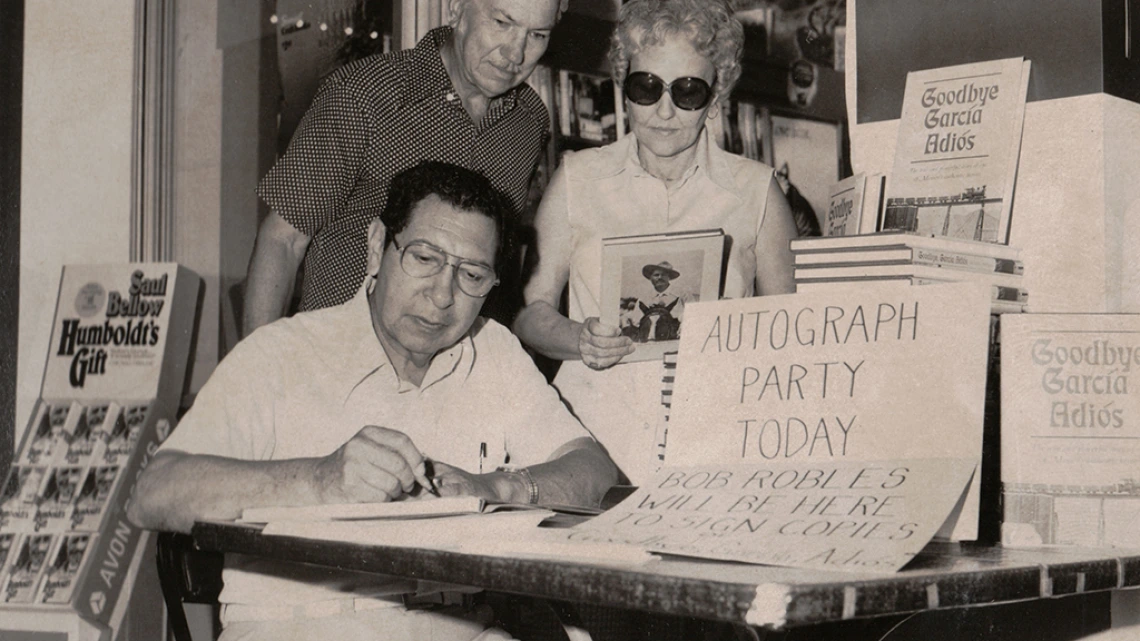Robert Benitez Robles papers

Robert Benitez Robles seated signing a copy of his book Goodbye, García, Adiós at an autograph party, ca 1976; Box 2.
Collection area: Borderlands
Collection dates: 1907-1988 bulk (bulk 1956-1982)
The collection (1907-1988) is arranged chronologically and contains materials including correspondence and letters, short stories, poems, a bilingual autobiography, pamphlets and speeches from Mr. Robles’s involvement in Barry Goldwater’s 1964 presidential campaign, personal documents, photos, materials demonstrating his involvement with the Mexican American community in Yuma, research files, reviews and features of his published work, and newspaper clippings related to his interests and work with different local organizations and initiatives.
Robert Benitez Robles was born in 1908 in Clifton, Arizona to Mariano Robles and Aurelia Benitez, both first-generation Mexican immigrants from Zacatecas. During much of his life, Robles was treated as a second class citizen due to his Mexican heritage, but, as he wrote in his autobiography, was “never discouraged” and he set attending college as a goal. After a short time working in a mine in Clifton, he enrolled at Arizona State Teachers College (later Northern Arizona University) in Flagstaff, Arizona. For a while, Robles taught, specializing in teaching bilingual students. In 1944, though he was over the draft age and a father and husband, Robles volunteered to join the war effort as a transport airman for the Navy until he sustained a back injury and was honorably discharged in 1945. After the war, Robles became an insurance agent for New York Life until his retirement in 1973.
Starting in the early 1960s, after switching his voter registration from Democrat to Republican, Robles became very active in Arizona politics, with the intention of reaching the Hispanic community that he saw as neglected by both the Democratic and Republican parties. As Chairman of the Yuma County Republican committee, Robles was charged with garnering support for the Republican candidates in elections. In 1961, he campaigned for Mac Matheson, who was running against Democrat Morris K. Udall for a seat in Congress, by visiting small towns and cold calling voters. Robles translated pamphlets, speeches, and other materials to Spanish to reach Hispanic voters. Despite being overwhelmingly Democrat, Yuma voted Republican due to Robles’ work. Incumbent Republican Governor Fannin rewarded Robles with a seat on the state employment security commission, though he had to decline the offer because of a conflict with his position at New York Life. Robles further used his expertise and connections to help a prominent Mexican American attorney, Larry Huerta, in his race for a seat on the State Industrial Commission in 1961. However, Larry Huerta still lost to Colonel Hugh Belden. His tireless efforts were also recognized by Barry Goldwater, who solicited Robles’s help to reach Hispanic voters in the Southwest and appointed him Field Representative, Western states for his 1964 presidential campaign.
Robles was active in community service beyond politics, as well. He was a member of American Legion for over 40 years, the Optimist club for 20 years, and was also a charter member of the Vesta club, a group of Hispanic professionals who were able to attend college through the GI Bill. Robles volunteered as a speech coach for several young men, many of whom became very successful later in their careers. From 1967-1969, while a member of the Yuma Chamber of Commerce, Robert Robles also worked to extend the hours at the Andrade/Algodones border crossing from ten to 18 hours daily, which helped boost the economies of both towns. Robles was also a scoutmaster and a 4-H leader.
Robles also put much of his time into writing, and he published several poems and a book, called
A collection guide explains what's in a collection. New to using our collections? Learn how to use a collection guide.
Collection guideAccess this collection
Visit us in person to access materials from this collection. Our materials are one-of-a-kind and require special care, so they can’t be checked out or taken home.
How to cite
Learn how to cite and use materials from Special Collections in your research.
